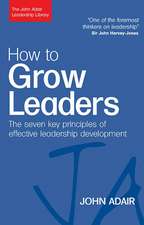The John Adair Lexicon of Leadership – The Definitive Guide to Leadership Skills and Knowledge
Autor John Adairen Limba Engleză Hardback – 2 mar 2011
Preț: 456.34 lei
Nou
Puncte Express: 685
Preț estimativ în valută:
87.32€ • 91.41$ • 72.25£
87.32€ • 91.41$ • 72.25£
Carte tipărită la comandă
Livrare economică 05-19 aprilie
Preluare comenzi: 021 569.72.76
Specificații
ISBN-13: 9780749463069
ISBN-10: 0749463066
Pagini: 512
Dimensiuni: 170 x 240 x 30 mm
Greutate: 1.03 kg
Editura: Kogan Page
ISBN-10: 0749463066
Pagini: 512
Dimensiuni: 170 x 240 x 30 mm
Greutate: 1.03 kg
Editura: Kogan Page
Notă biografică
John Adair is a leading authority on leadership and leadership development. He advises many organizations in business, government, education, health and the voluntary sector. Over a million managers worldwide have taken part in the Action-Centred Leadership programs he pioneered. Adair is the author of over 50 books, including the leadership classic How to Grow Leaders, (Kogan Page), and he continues to write and teach.
Descriere
From the renowned leadership expert Adair comes this compendium of all his classic works, including "How to Grow Leaders, The Inspirational Leader, Leadership and Motivation, Not Bosses but Leaders, Leadership for Innovation" and "Art of Creative Thinking."
Cuprins
Chapter - 00: Introduction; Section - ONE: Not bosses but leaders; Chapter - 01: Qualities of leadership; Chapter - 02: The circles interact; Chapter - 03: Leaders or managers?; Chapter - 04: High-performance teams; Chapter - 05: The purpose of industry; Chapter - 06: Moving from plans to action; Chapter - 07: Sharing and caring; Chapter - 08: Leadership and power; Chapter - 09: Leadership from within; Section - TWO: The inspirational leader; Chapter - 10: The three basic approaches; Chapter - 11: The authority of knowing; Chapter - 12: Levels of leadership; Chapter - 13: Giving and receiving; Chapter - 14: Beyond the call of duty; Chapter - 15: The common task; Chapter - 16: Pulling the threads together; Chapter - 17: The why question; Chapter - 18: The test of leadership; Section - THREE: How to grow leaders; Chapter - 19: The qualities approach; Chapter - 20: The group or functional approach; Chapter - 21: Leaders or managers?; Chapter - 22: The Situational Approach; Chapter - 23: Levels of leadership; Chapter - 23a: How to grow leaders - The seven principles; Section - FOUR: Leadership and motivation; Chapter - 24: Functional Leadership; Chapter - 25: Action-Centred Leadership; Chapter - 26: The Fifty-Fifty Rule; Chapter - 27: Maslow's Hierarchy of Needs; Chapter - 28: The application of Maslow's ideas in industry; Chapter - 29: Herzberg's Motivation - Hygiene Theory; Chapter - 30: How to motivate others: the eight principles of motivation; Chapter - 31: Parting reflections - towards a new theory of motivation; Section - FIVE: Leadership for innovation; Chapter - 32: What is innovation?; Chapter - 33: The conditions for successful innovation; Chapter - 34: Organizing for team creativity; Chapter - 35: Case Study: The DNA Laboratory; Chapter - 36: Case Study: Soichiro Honda - Leader for innovation; Chapter - 37: Real commitment from the top; Chapter - 38: How to motivate the creative individual; Chapter - 39: Team creativity; Chapter - 40: Harvesting ideas; Chapter - 41: Overcoming resistance to change; Section - SIX: The art of creative thinking; Chapter - 42: On human creativity; Chapter - 43: Use the stepping stones of analogy; Chapter - 44: Make the strange familiar and the familiar strange; Chapter - 45: Widen your span of relevance; Chapter - 46: Practise serendipity; Chapter - 47: Chance favours only the prepared mind; Chapter - 48: Curiosity; Chapter - 49: Keep your eyes open; Chapter - 50: Listen for ideas; Chapter - 51: Reading to generate ideas; Chapter - 52: Keep a notebook; Chapter - 53: Test your assumptions; Chapter - 54: Make better use of your Depth Mind; Chapter - 55: Do not wait for inspiration; Chapter - 56: Sharpen your analytical skills; Chapter - 57: Suspend judgement; Chapter - 58: Learn to tolerate ambiguity; Chapter - 59: Drift, wait and obey; Chapter - 60: Sleep on the problem; Chapter - 61: Working it out; Chapter - 62: Think creatively about your life












